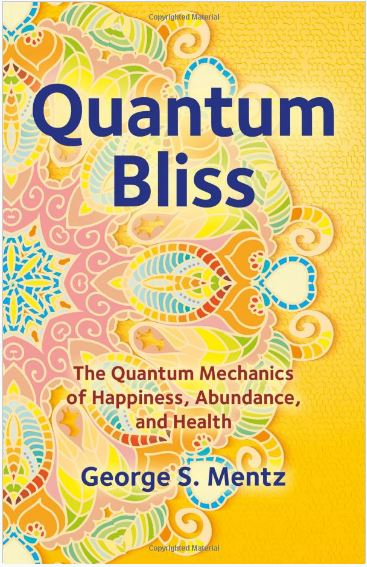 Quantum Bliss: The Quantum Mechanics of Happiness, Abundance, and Health by George S. Mentz
Quantum Bliss: The Quantum Mechanics of Happiness, Abundance, and Health by George S. Mentz
Reviewed by David Lorimer
For some years I have been interested in New Thought and have studied the work of writers such as Ralph Waldo Trine, Thomas Troward, Charles Haanel, Wallace Wattles, Napoleon Hill, Neville Goddard, Earl Nightingale and others. This book by lawyer and global management consultant George Mentz provides a superb summary and practical introduction to this way of thinking and living from inside to outside, recognising the creative power of thought and imagination. My only real quibble is the title, which I suspect was dreamed up by the publishers on the strength of the quantum brand. The subtitle even refers to the quantum mechanics of happiness, abundance and health. There is a mechanics involved, but I’m not convinced that it is quantum mechanics.
The various chapters explain and give practical guidance on inner capacities, spiritual and success exercises, paths to prosperity, laws of success, means of spiritual empowerment and steps to fulfilment. The essential insight is that we are and become what we think and this determines our well-being and spiritual – mental condition. It presupposes that we are microcosms of one Universal Mind with which we can cooperate and co-create. In the course of his exposition, the ideas of many other thinkers are brought to bear including Marcus Aurelius, Emerson, Plato, Aristotle, Meister Eckhart, Lao Tsu and the Upanishads. If you look around, you will realise that every object you see in your house was once a thought, and that the creative process proceeds from the inside out, from idea to manifestation.
Our inner attitude is critical and also constitutes an implicit form of spiritual practice. Among the most important attributes are faith, focus and gratitude, an openness to possibility and abundance rather than a focus on lack. Feeling also plays a central role as well as a real sense of worth. Hence the importance of our dominant self-concept. Then all this needs to be put into bold, efficient action, not just thought about – which probably involves changing our default settings; that is the hard part, but evidence suggests that an activity pursued for 21 days becomes a new habit. The book combines mental, emotional and spiritual aspects into a synthesis, speaking, for instance, of the need for growth and a higher purpose in tune with the infinite: ‘Love is the quality of thought and emotion that will propel us into a state of bliss and achievement. Love is all there is. Focus on the good, the great, the constructive and the beauty of life. See the best in all there is. Look for the good that occurs in the world.’ (p. 42)
One chapter lists more than 70 concise laws of success in terms of metaphysics and philosophy. These include laws thought energy, intention, authenticity, regeneration, constructive thought, integrity, empathy, boldness, humility, balance and many others. Readers will find different ones more or less significant in accordance with their own experience. This is followed by a concise summary of spiritual empowerment in a way that can immediately be applied to life. Half measures do not work in this area as we need to be ‘a focused person filled with belief’ in order to make full use of our capacity. As Napoleon Hill emphasised, definiteness of purpose is key – knowing what you want and dedicating yourself to it. Here Mentz also gives detailed and helpful instructions; as with many self-help books, the real key lies in excellent application rather than just moving onto the next book. He reminds us that it is not only our actions but also our inactions that constitute character. He ends with a series of inspiring quotes from writers through the ages. I particularly appreciated Epicurus – ‘not what we have, but what we enjoy constitutes our abundance.’ Goethe – ‘all truly wise thoughts have been thought already thousands of times; but to make them really hours we must think them over again honestly until they take root in our personal expression.’ And Tesla – ‘the gift of mental power comes from God, Divine Being, and if we concentrate our minds on that truth, we become in tune with this great power.’ A wise, practical and potentially life-changing book.
